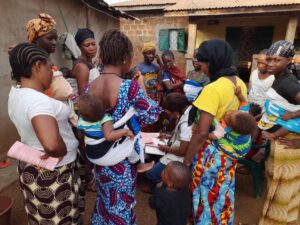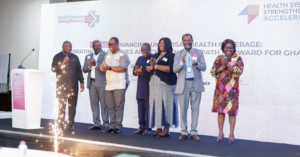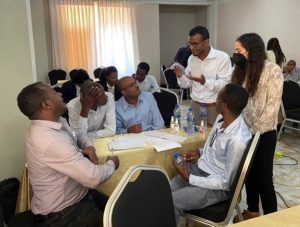Ghana
The Challenge
Ghana is recognized as a pioneer within sub-Saharan Africa for its efforts to advance universal health coverage (UHC). As Ghana develops its UHC Roadmap in 2019, key health actors will need to harmonize their approach to realize this roadmap, as well as to mobilize and efficiently use health resources to achieve Ghana’s vision of health for all.
Opportunity
In Ghana, the Accelerator will build on USAID’s past investments in Ghana to develop a scope of work with the Government and other local actors to ensure adequate and efficient use of health sector resources to achieve Ghana’s vision of health for all. Key objectives may include:
- Facilitate a multi-stakeholder dialogue and process to develop the UHC Roadmap, using systems-thinking and collaborative learning approaches;
- Capacitate health actors to generate, analyze and use data for advocacy, decision- and policy-making;
- Support the health sector to:
- 1) Strengthen advocacy for more resources for health and
- 2) Enable more efficient resource use.
Key partnerships
The Accelerator will work with a range of government actors, private sector, civil society, development partners, and other key stakeholders to leverage existing investments and further reinforce multi-sectoral partnership
Our Work
The Accelerator will support Ghanaian health stakeholders to tackle several of its most pressing health systems challenges in a collaborative manner that supports self-reliance, including:
- Strengthen overall stewardship and capacity within the health sector to drive health systems change
- Work with the National Health Insurance Authority (NHIA) to strengthen its role as a strategic purchaser over the course of our program and support the NHIA to make evidence-based decisions around the following questions —What to purchase? From whom to purchase? How to purchase? — along with thinking about the enabling systems and change management approaches necessary to support these decisions
- Support the Ministry of Health as they lead an evidence-based process for refining, disseminating, and updating the “essential universal services” in the UHC Roadmap, as well as developing complementary policies needed to support the scale up of these services
- Build on the support provided through the USAID Systems for Health (S4H) project, and support the Government of Ghana to advance the continuation, transition, and scale-up of the preferred primary care provider (PPP) networks. This work will be primarily centered on: 1) refining the network design and continuing implementation to generate further policy recommendations, 2) transitioning network support to government stakeholders and 3) scaling-up networks within the Volta region and beyond
News & Resources: GHANA
Un outil de plaidoyer axé sur le changement de comportement : Renforcer le dialogue citoyen pour un financement durable de la santé
Un outil de plaidoyer budgétaire innovant favorise l'engagement citoyen et...
Read MoreAccelerator Program Paves the Way for Ghana’s Launch of National Health Database
Discover how the Accelerator program played a vital role in...
Read MoreGlobal Case Study Presentation on Rehabilitation Integration
Join us on September 11 for insights on integrating rehabilitation...
Read More







